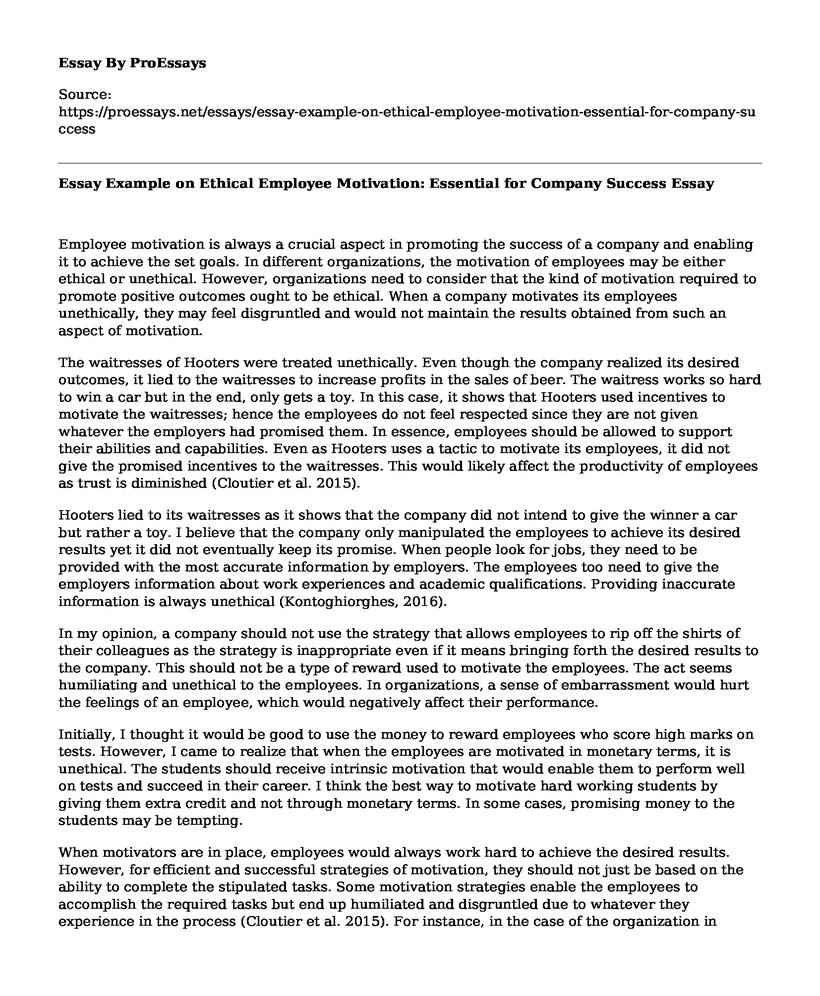Employee motivation is always a crucial aspect in promoting the success of a company and enabling it to achieve the set goals. In different organizations, the motivation of employees may be either ethical or unethical. However, organizations need to consider that the kind of motivation required to promote positive outcomes ought to be ethical. When a company motivates its employees unethically, they may feel disgruntled and would not maintain the results obtained from such an aspect of motivation.
The waitresses of Hooters were treated unethically. Even though the company realized its desired outcomes, it lied to the waitresses to increase profits in the sales of beer. The waitress works so hard to win a car but in the end, only gets a toy. In this case, it shows that Hooters used incentives to motivate the waitresses; hence the employees do not feel respected since they are not given whatever the employers had promised them. In essence, employees should be allowed to support their abilities and capabilities. Even as Hooters uses a tactic to motivate its employees, it did not give the promised incentives to the waitresses. This would likely affect the productivity of employees as trust is diminished (Cloutier et al. 2015).
Hooters lied to its waitresses as it shows that the company did not intend to give the winner a car but rather a toy. I believe that the company only manipulated the employees to achieve its desired results yet it did not eventually keep its promise. When people look for jobs, they need to be provided with the most accurate information by employers. The employees too need to give the employers information about work experiences and academic qualifications. Providing inaccurate information is always unethical (Kontoghiorghes, 2016).
In my opinion, a company should not use the strategy that allows employees to rip off the shirts of their colleagues as the strategy is inappropriate even if it means bringing forth the desired results to the company. This should not be a type of reward used to motivate the employees. The act seems humiliating and unethical to the employees. In organizations, a sense of embarrassment would hurt the feelings of an employee, which would negatively affect their performance.
Initially, I thought it would be good to use the money to reward employees who score high marks on tests. However, I came to realize that when the employees are motivated in monetary terms, it is unethical. The students should receive intrinsic motivation that would enable them to perform well on tests and succeed in their career. I think the best way to motivate hard working students by giving them extra credit and not through monetary terms. In some cases, promising money to the students may be tempting.
When motivators are in place, employees would always work hard to achieve the desired results. However, for efficient and successful strategies of motivation, they should not just be based on the ability to complete the stipulated tasks. Some motivation strategies enable the employees to accomplish the required tasks but end up humiliated and disgruntled due to whatever they experience in the process (Cloutier et al. 2015). For instance, in the case of the organization in which the shirts of losers were ripped off, they felt humiliated. Such employees may be unsatisfied and would not be determined to undertake the most relevant activities in the workplace. In essence, they will lose self-determination and would not feel like part of an organization's success.
Conclusion
Usually, motivation enables employees to accomplish the required organizational tasks and goals. Ethical motivation brings forth the desired outcomes and makes the employees satisfied with their work and feel a sense of empowerment Unethical motivation should be avoided at all costs in the workplace.
References
Cloutier, O., Felusiak, L., Hill, C., & Pemberton-Jones, E. J. (2015). The Importance of Developing Strategies for Employee Retention. Journal of Leadership, Accountability & Ethics, 12(2). Retrieved from http://www.m.www.na-businesspress.com/JLAE/Pemberton-JonesEJ_Web12_2_.pdf
Kontoghiorghes, C. (2016). Linking high performance organizational culture and talent management: satisfaction/motivation and organizational commitment as mediators. The International Journal of Human Resource Management, 27(16), 1833-1853. Retrieved from https://doi.org/10.1080/09585192.2015.1075572
Cite this page
Essay Example on Ethical Employee Motivation: Essential for Company Success. (2023, Jan 11). Retrieved from https://proessays.net/essays/essay-example-on-ethical-employee-motivation-essential-for-company-success
If you are the original author of this essay and no longer wish to have it published on the ProEssays website, please click below to request its removal:
- Essay Sample on Professional Development, Social Impact, and International Reporting
- Nursing Beliefs and Practices Essay Example
- Self-Efficacy Beliefs Among Teachers in the Teaching Profession Paper Example
- Essay Sample on Leadership & Motivation: The Key to Successful Team Performance
- Essay Sample on My Future Career: Police Officer
- Personal Statement on School of Business: My Journey to Global Business Opportunities
- Essay Example on Tangible and Intangible Rewards: The Keys to Employee Retention and Motivation







